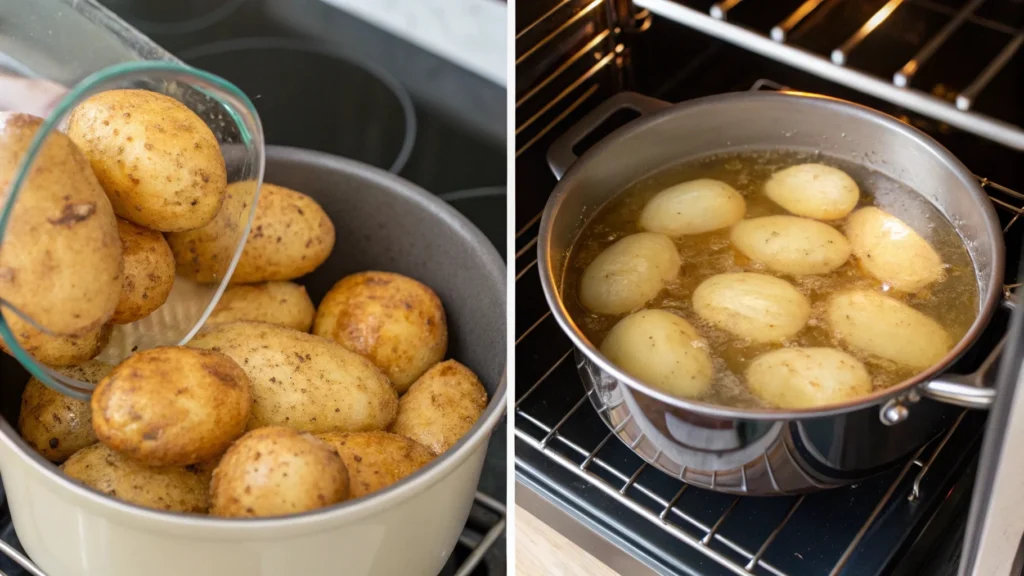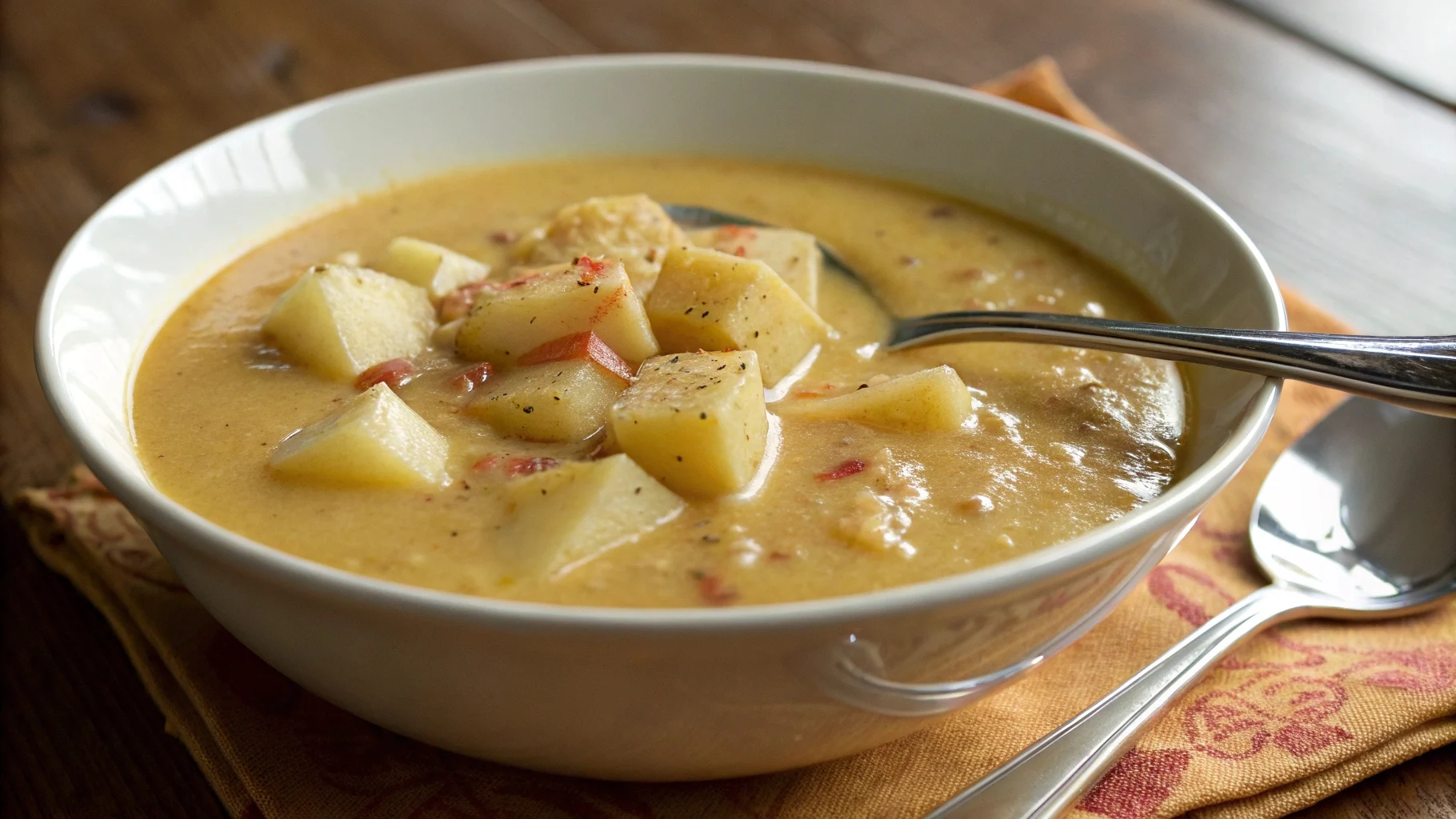Table of contents
Should I Cook Potatoes Before Adding to Soup?
Potatoes are a staple in countless soups, but the question often arises: Should I cook potatoes before adding to soup? While this may seem like a small detail, it can make a big difference in the flavor, texture, and cooking process. In this article, we’ll explore the pros and cons of pre-cooking potatoes, the best practices for both approaches, and how to decide what works best for your recipe. Whether you’re a soup novice or a seasoned home chef, you’ll find actionable tips to make your soups shine.
Introduction to Cooking Potatoes for Soup
Potatoes are one of the most versatile ingredients in the kitchen, prized for their ability to absorb flavors and add substance to soups. But whether or not to cook them before tossing them into your simmering pot can leave many scratching their heads.
Why Potatoes Are a Popular Ingredient in Soup
Potatoes bring a creamy, hearty texture to soups, making them a natural choice for everything from classic potato soup to hearty vegetable stews. Their ability to thicken broths and complement other ingredients, like carrots or leeks, ensures they’re a favorite for home cooks and professionals alike.
The Key Question: To Cook or Not to Cook Beforehand?
Deciding whether to pre-cook potatoes boils down to the type of soup you’re making and your personal preferences. Pre-cooking offers control over texture and consistency, while raw potatoes can save time and help flavors meld as they cook together. In the sections ahead, we’ll break down the advantages of each method and provide practical tips for achieving the best results.
Pros of Cooking Potatoes Before Adding to Soup

When it comes to the question, Should I cook potatoes before adding them to soup? one strong argument is the list of benefits pre-cooking offers. By preparing potatoes beforehand, you can have better control over their texture and consistency while saving time during the actual soup-making process.
Enhanced Texture Control
Pre-cooking potatoes lets you control their doneness. Want firmer chunks? Cook them lightly. Prefer creamy, melt-in-your-mouth bites? Simmer them longer. When you add raw potatoes directly to the soup, you risk uneven cooking, especially if you’re working with other ingredients that cook at different rates.
Consistent Cooking Across Ingredients
Soups often involve a medley of ingredients—some delicate, some robust. By pre-cooking potatoes, you eliminate the risk of undercooked potatoes when other components are already done. For instance, adding pre-boiled potatoes ensures they won’t steal precious cooking time from soft vegetables like spinach or zucchini.
Reduced Cooking Time for Soup
Let’s face it—time matters in the kitchen! Pre-cooking potatoes means they’re essentially ready when they hit the pot. This is especially helpful if you’re making a quick soup or want to serve guests promptly. Plus, your soup won’t need to simmer endlessly to soften raw potatoes, preserving the flavors of delicate herbs and spices.
Pre-cooking potatoes doesn’t just save time; it adds flexibility and reliability to your cooking process. It’s no wonder so many chefs swear by this method!
Cons of Cooking Potatoes Before Adding to Soup
Although pre-cooking potatoes has its perks, it’s not without drawbacks. For some, the extra steps and potential loss of flavor might make adding raw potatoes directly to soup more appealing. Let’s explore the downsides to see why the debate—Should I cook potatoes before adding them to soup?—remains unsettled.
Risk of Overcooking Potatoes
Pre-cooked potatoes can turn mushy if they spend too long in the soup, especially in recipes that require extended simmering. This can leave you with a starchy, gluey consistency rather than a vibrant, hearty dish. Timing is everything when you’ve pre-cooked the potatoes.
Additional Steps and Dishes to Clean
Cooking potatoes beforehand involves extra steps—peeling, boiling, or roasting—and often means another pot to clean. For busy home cooks, this added effort might outweigh the benefits, particularly if the soup is already a one-pot meal.
Potential Loss of Flavor in the Soup
Raw potatoes absorb the rich flavors of the soup as they cook, creating a harmonious blend of taste and texture. Pre-cooked potatoes, however, may not soak up the broth’s nuances as effectively, which could result in a less flavorful final product.
While pre-cooking potatoes has its advantages, skipping this step can simplify the process and allow the potatoes to meld seamlessly with the rest of your soup’s ingredients. Ultimately, the choice depends on the soup you’re making and your priorities in the kitchen.
Factors to Consider When Deciding
Deciding whether to pre-cook potatoes or add them raw to your soup can depend on several factors. Ask yourself, Should I cook potatoes before adding them to soup? isn’t just about convenience—it’s about tailoring your method to your desired outcome.
Type of Soup You’re Making
Different soups call for different approaches. If you’re making a creamy soup, like a classic potato leek soup, pre-cooking the potatoes allows you to blend them into a silky, smooth texture. On the other hand, hearty stews and chunky vegetable soups benefit from raw potatoes cooking slowly, soaking up the rich broth flavors.
Type of Potato Used
Not all potatoes behave the same way in soup. Waxy potatoes like red or fingerling varieties hold their shape well, making them ideal for adding raw. In contrast, starchy potatoes like Russets break down easily, which can be useful for thickening broths but might require pre-cooking to control texture.
Cooking Time for Your Soup
For recipes with long-simmering times, raw potatoes work beautifully. They absorb flavors and cook evenly alongside other ingredients. However, if you’re making a quick soup or need dinner on the table fast, pre-cooked potatoes can save precious time while ensuring they’re perfectly tender.
By understanding these factors, you can confidently decide the best approach for your recipe. For more tips on crafting flavorful soups, check out our guide to cheesy potato soup.
How to Cook Potatoes Before Adding Them to Soup
If you’ve decided the answer to Should I cook potatoes before adding to soup? is yes, there are several methods to do so effectively. Each approach has its benefits, depending on the recipe and desired texture.
Methods for Pre-Cooking Potatoes
- Boiling: A quick and easy way to cook potatoes until just tender. Simply dice them into evenly sized pieces and simmer in salted water for 5–7 minutes.
- Steaming: This method preserves more of the potatoes’ nutrients and is great for maintaining their flavor. Place peeled potato chunks in a steamer basket over boiling water and cook until fork-tender.
- Roasting: Roasting adds a caramelized flavor and firm texture, which works wonderfully in soups where you want extra depth. Toss potatoes in oil, sprinkle with salt, and roast at 400°F for 15–20 minutes.
Tips for Avoiding Overcooking
To avoid mushy potatoes, always undercook them slightly before adding them to the soup. Remember, they’ll continue cooking as the soup simmers, absorbing the surrounding flavors without falling apart.
Pre-cooking might involve a little extra effort, but it gives you precise control over how the potatoes turn out. Whether you choose to boil, steam, or roast, this step can take your soup from good to great!
Best Practices for Adding Raw Potatoes to Soup
If you’ve chosen to skip pre-cooking and add raw potatoes directly to your soup, it’s important to follow some best practices. While this approach saves time and allows the potatoes to soak up rich flavors, a few key tips can ensure your soup turns out just right.
Cutting Potatoes into Even Sizes
Uniformly sized pieces are crucial when adding raw potatoes to soup. Uneven cuts can lead to inconsistent cooking, with some pieces turning mushy while others remain undercooked. Aim for chunks about the same size as your other ingredients for a well-balanced texture.
Adjusting Cooking Time and Temperature
Raw potatoes need time to soften and absorb the broth’s flavors. After adding them to the pot, simmer the soup gently to avoid breaking the potatoes apart. Most raw potatoes will take 20–30 minutes to cook, but starchy varieties like Russets may soften faster. Be sure to check for doneness with a fork.
Using Broth or Water for Flavor Absorption
Since potatoes are excellent at soaking up surrounding flavors, using a rich broth or stock enhances their taste. Adding them directly to water might leave them bland, so don’t skimp on seasoning or aromatic ingredients like garlic and herbs.
Adding raw potatoes directly to your soup can simplify the cooking process while infusing the dish with robust, earthy flavors. With these tips, you can confidently choose this method whenever it suits your recipe.
Expert Tips and Tricks
Looking for advice to elevate your soups? Whether you’re debating Should I cook potatoes before adding them to soup? or perfecting your process, these expert tips and tricks will help you get the most out of your ingredients.
Tips from Chefs and Home Cooks
- Layer Flavors Gradually: Add potatoes early when cooking raw to let them absorb the broth’s flavors. For pre-cooked potatoes, add them in the final stages to preserve their texture.
- Test as You Go: Taste-test potatoes frequently during cooking to achieve your desired texture. Overcooking can quickly turn a hearty soup into a starchy mess.
- Pair with the Right Ingredients: Match your potatoes to the soup type. Waxy potatoes hold their shape well in brothy soups, while starchy ones shine in creamy recipes.
Common Mistakes to Avoid
- Skipping Pre-Soak for Starchier Varieties: If using Russets, soak them briefly in cold water to remove excess starch. This prevents cloudiness in the soup.
- Adding Potatoes Too Late: Raw potatoes added near the end of cooking may stay undercooked, leaving the soup uneven.
- Overloading the Pot: Too many potatoes can overshadow other ingredients and thicken the soup too much.
Mastering these tips ensures your soups turn out perfect, no matter how you choose to cook your potatoes. Stay creative and let your taste buds guide you!
FAQs Based on Google’s ‘People Also Ask’
When exploring Should I cook potatoes before adding to soup? you may come across common questions that can help clarify the best approach. Let’s address a few of the most frequently asked ones.
What Happens If You Don’t Cook Potatoes Before Adding Them to Soup?
If you don’t pre-cook your potatoes, they will soften as the soup simmers. This allows them to absorb the broth’s flavors, creating a harmonious taste throughout. However, it’s important to monitor their cooking time to avoid undercooked chunks or overly starchy results.
How Long Should Potatoes Cook in Soup?
The cooking time for raw potatoes in soup depends on their size and type. Diced potatoes typically need 20–30 minutes to become tender in a simmering pot. Waxy varieties may take slightly longer than starchy ones like Russets.
Which Potatoes Are Best for Soup?
Waxy potatoes, such as Yukon Gold or red potatoes, are ideal for soups where you want them to hold their shape. For creamy soups, starchy varieties like Russets work better as they break down and thicken the broth.
Answering these questions provides helpful insights to guide your cooking process and ensure your soups turn out just right.
Conclusion: Should You Cook Potatoes Before Adding to Soup?
So, Should I cook potatoes before adding them to the soup? The answer lies in your recipe, cooking style, and desired outcome. Pre-cooking potatoes offers control over texture and speeds up the process, making it a great choice for quick meals or precise results. On the other hand, adding raw potatoes allows them to soak up the broth’s rich flavors and simplifies preparation.
Ultimately, understanding your ingredients and following best practices—like cutting potatoes evenly or pairing them with the right cooking method—can make all the difference. Whether you’re crafting a chunky vegetable stew or a velvety potato soup, choosing the right method ensures a delicious, satisfying dish every time.
For more ideas to elevate your soups, check out our guide to what can be added to potato soup for more flavor. Happy cooking!

